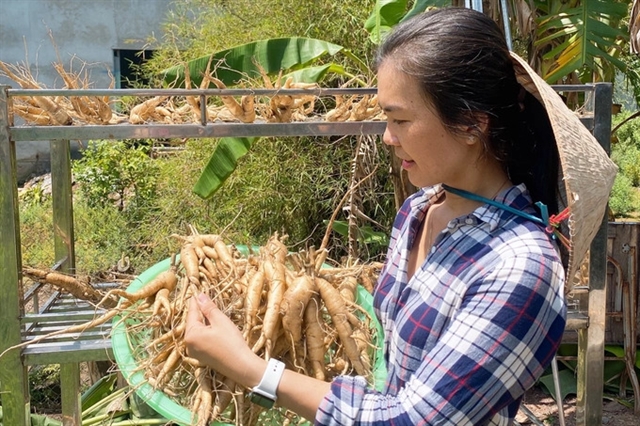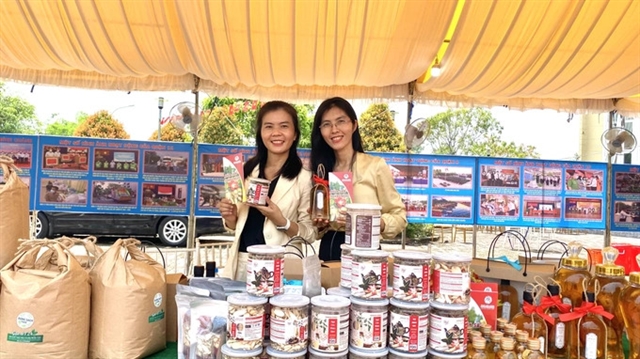 Society
Society

 |
| Phan Thị Ngọc Bích with Bố Chính ginseng. — Photo courtesy of the company |
LONG AN — Carrying baskets of harvested ginseng in the garden, Phan Thị Ngọc Bích, a 36-year-old woman living in Đức Huệ District, Long An Province, is happy that her dream has finally come true.
Bích said she always wanted to find herbal medicine that could both improve her parents' health and cure their pain when she saw them suffer with back pain.
After graduating from university with a major in finance and banking, Bích worked many different jobs. After saving some money, she was determined to return to her hometown to fulfil her childhood dream.
"At that time, I just worked hard without worrying, because I wanted to save enough money to start a business. I know money is never enough. So I seriously thought about building a business plan," Bích told Dân Trí online newspaper.
In mid-2018, Bích met Nguyễn Phượng Hoàng Cương, her best friend from elementary school.
She shared the idea to Cương, who also wanted to start an agricultural business. They started researching and learning about medicinal plants. As she worked in the medical sector, Cương knew about a precious type of ginseng – Bố Chính ginseng – which is highly useful for people with insomnia or joint problems.
They leased a hectare of land for VNĐ200 million (US$8,480) and bought seeds for VNĐ8 million per kilo.
"I heard people say this tree is easy to grow and care for. I didn't believe it, but I still had a lot of hope. We faced so many difficulties and it seemed like we had to give up halfway through," Bích said.
There were many problems with the weather and weeds when they first began cultivating ginseng. More than 90 per cent of the seedlings died.
"Sometimes we nearly ran out of money and were very discouraged. We tried to encourage and support each other to overcome difficulties."
With more than VNĐ200 million of initial investment gone, Bích sought to raise capital to continue their ginseng farming. At the same time, she worked in an office in HCM City.
At the end of 2019, the COVID-19 pandemic broke out. Bích returned to her hometown to focus on planting ginseng. Cương remained in the city with her own family, but still worked with Bích.
After the failures, they had initial success. The amount of ginseng also increased.
They harvested six tonnes per hectare.
"Ginseng has a maximum yearly yield of roughly 10 tonnes per hectare as they are cultivated properly," Bích said.
A foreign investor also knew about their ginseng growing model and offered to send engineers to support with farming techniques and crossbreed American red ginseng with Bố Chính ginseng to optimise profits.
In 2019, Bích and Cương founded Hoàng Ngọc Global Company.
During the COVID-19 pandemic, their company, with the support of other people, cooked more than 3,000 portions of ginseng tea and ginseng chicken porridge to send to doctors and patients in HCM City. Since then, more people learned about their products, helping them to have more customers. Their business improved after the pandemic subsided.
"Many people think that ginseng is easy to grow and brings high profits. In fact, the high economic potential is true, but growing ginseng is very difficult and requires a lot of care to have a good result," said Bích.
Growers can harvest ginseng after a year of planting.
However, at the time of harvest, not all plots of ginseng give good results.
Bích has also grown other plants after harvesting ginseng to restore the soil for the next crop.
 |
| Phan Thị Ngọc Bích and Nguyễn Phượng Hoàng Cương with their products made from ginseng. — Photo courtesy of the company |
Currently, Bích and Cương have five hectares of ginseng. They divide them into small plots and coordinate with other local growers for better management and care.
"We can harvest 5-7 tonnes per hectare a year and strive to reach 10 tonnes. Our customers come from all over the country, and they often contact us through electronic sales channels. Our raw ginseng is also exported to the US through our partners."
The company now has about 30 different products from ginseng such as ginseng wine, ginseng flower tea, honey-soaked ginseng, fresh and dried ginseng. The company's monthly revenue is up to VNĐ500 million.
The company also cooperates with tourism firms.
The economic value of Bố Chính ginseng is quite high and the market for products still has a lot of potential.
Bích said the company is expected to expand ginseng cultivation to tens of hectares to meet the needs of partners.
Not only helping their family earn an income, the company also contributed to changing the structure of crops in the locality, creating jobs for dozens of workers. — VNS
Ginseng development Under the ginseng development programme to 2030, Việt Nam aims to preserve local ginseng genetic sources in the wild, and conserve the biodiversity of forest ecosystemsThe country has set the target to have 24,000 hectares of ginseng by 2030 and 100 per cent of the area will have growing area codes and geographical indicators.From 2030, the country would exploit about 300 tonnes of ginseng a year which would satisfy the requirements on origin traceability.The localities with potential to develop ginseng are Quảng Nam, Kon Tum, Gia Lai, Lâm Đồng, Thừa Thiên-Huế, Nghệ An, Lào Cai, Lai Châu and Điện Biên. Besides the expansion of ginseng areas, Việt Nam will invest in ginseng processing facilities, with priority given to the production of medicine, health supplementary food, cosmetics and macrobiotics.The Ministry of Agriculture and Rural Development estimated that the programme would cost VNĐ52.058 trillion, of which VNĐ1.359 trillion, or 2.6 per cent, would be from the State budget, while the remaining VNĐ50.690 trillion would be from private investment sources. — VNS




